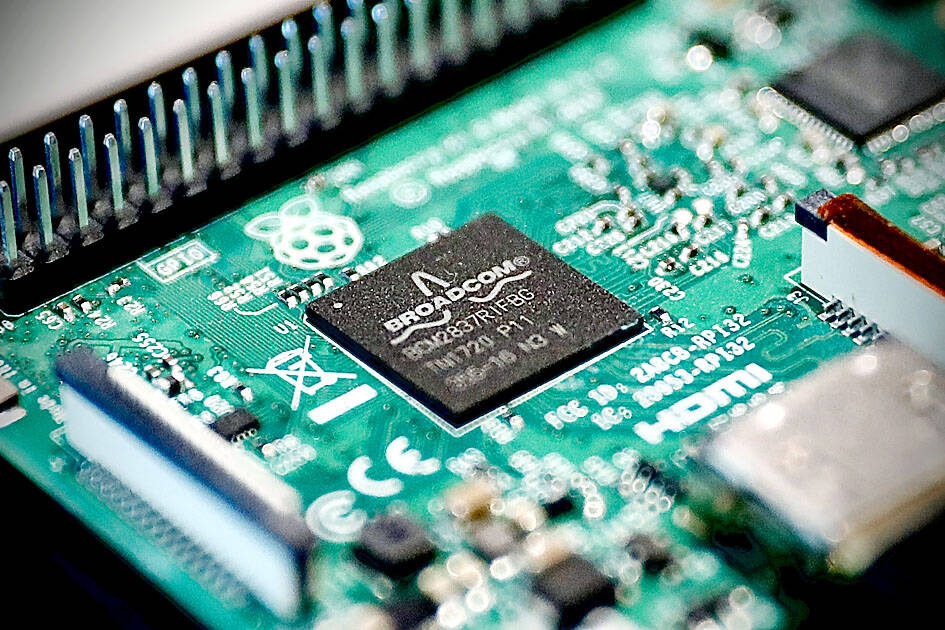Asia’s top chip stocks tumbled yesterday, ensnared in an escalating US-China tech race that has erased more than US$240 billion from the sector’s global market value.
Taiwan Semiconductor Manufacturing Co (TSMC, 台積電), the world’s largest contract chipmaker, plunged a record 8.3 percent, while Samsung Electronics Co and Tokyo Electron Ltd also declined.
The selloff spread to the foreign-exchange market as investors tally up the damage from the sweeping curbs the US is imposing on companies that conduct technology business with China.

Photo: RITCHIE B. TONGO, EPA-EFE
The measures imposed by the administration of US President Joe Biden erect barriers of entry to China’s market by limiting the ability of US firms to sell equipment and tech to their Chinese counterparts. There are concerns that the restrictions could spread if Washington widens the initiative to include other countries, while questions also remain over the scope and final impact of the moves.
“It is difficult to call a bottom on the performance of the chip sector,” Global CIO Office chief executive officer Gary Dugan said. “The big story is that the West is becoming profoundly more concerned about security around any form of technology. We see no reason to re-enter the sector for the moment despite the profound poor performance.”
US chip stocks were on track to decline for a third day, with Nvidia Corp, Advanced Micro Devices Inc, Qualcomm Inc and Texas Instruments Inc all down more than 1 percent yesterday before the bell.
Chip toolmaker ASML Holding NV traded down 2.3 percent in Amsterdam, bringing three-day losses to more than 11 percent.
The US announced the export curbs on Friday and there have been suggestions that similar actions might be deployed in other countries to ensure international cooperation.
The announcement spurred a two-day rout of more than 9 percent in the Philadelphia Stock Exchange Semiconductor Index, which closed on Monday at its lowest level since November 2020.
Samsung lost as much as 3.9 percent, the most in a year, while SK Hynix Inc, one of the world’s largest makers of memory chips that has facilities in China, slid 3.5 percent before paring losses.
In Tokyo, Renesas Electronics Co shed almost 6 percent, with Tokyo Electron losing a similar amount.
The current rout has already wiped out more than US$240 billion from chip stocks worldwide since Thursday’s close, data compiled by Bloomberg showed.
The selloff extended to currency markets, with the South Korean won sliding as much as 1.8 percent versus the greenback while the New Taiwan dollar declined 0.7 percent.
The curbs are a “big setback to China” and “bad news” for global semiconductors, Nomura Holdings Inc analyst David Wong (黃作慶) wrote in a note on Monday.
China’s localization efforts might also be “at risk as it may not be able to use advanced foundries in Taiwan and [South] Korea,” Wong wrote.
Shares of Chinese chipmakers extended their recent losses yesterday, with Morgan Stanley saying that the broader restrictions around supercomputers and multinational capital investment in China could be “disruptive.”

Vincent Wei led fellow Singaporean farmers around an empty Malaysian plot, laying out plans for a greenhouse and rows of leafy vegetables. What he pitched was not just space for crops, but a lifeline for growers struggling to make ends meet in a city-state with high prices and little vacant land. The future agriculture hub is part of a joint special economic zone launched last year by the two neighbors, expected to cost US$123 million and produce 10,000 tonnes of fresh produce annually. It is attracting Singaporean farmers with promises of cheaper land, labor and energy just over the border.

US actor Matthew McConaughey has filed recordings of his image and voice with US patent authorities to protect them from unauthorized usage by artificial intelligence (AI) platforms, a representative said earlier this week. Several video clips and audio recordings were registered by the commercial arm of the Just Keep Livin’ Foundation, a non-profit created by the Oscar-winning actor and his wife, Camila, according to the US Patent and Trademark Office database. Many artists are increasingly concerned about the uncontrolled use of their image via generative AI since the rollout of ChatGPT and other AI-powered tools. Several US states have adopted

A proposed billionaires’ tax in California has ignited a political uproar in Silicon Valley, with tech titans threatening to leave the state while California Governor Gavin Newsom of the Democratic Party maneuvers to defeat a levy that he fears would lead to an exodus of wealth. A technology mecca, California has more billionaires than any other US state — a few hundred, by some estimates. About half its personal income tax revenue, a financial backbone in the nearly US$350 billion budget, comes from the top 1 percent of earners. A large healthcare union is attempting to place a proposal before

KEEPING UP: The acquisition of a cleanroom in Taiwan would enable Micron to increase production in a market where demand continues to outpace supply, a Micron official said Micron Technology Inc has signed a letter of intent to buy a fabrication site in Taiwan from Powerchip Semiconductor Manufacturing Corp (力積電) for US$1.8 billion to expand its production of memory chips. Micron would take control of the P5 site in Miaoli County’s Tongluo Township (銅鑼) and plans to ramp up DRAM production in phases after the transaction closes in the second quarter, the company said in a statement on Saturday. The acquisition includes an existing 12 inch fab cleanroom of 27,871m2 and would further position Micron to address growing global demand for memory solutions, the company said. Micron expects the transaction to